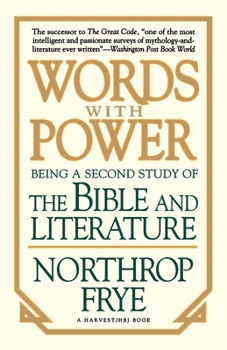Words with Power: Being a Second Study "The Bible and Literature"
Select Format
Select Condition 
Book Overview
In Words With Power, literary critic and theorist Northrop Frye continues his exploration, begun in The Great Code, of the influence of Biblical themes and forms of expression on Western literature, with discussions of authors ranging from Chaucer and Shakespeare to Yeats and Eliot. Frye identifies four key elements found in the Bible--the mountain, the garden, the cave, and the furnace--and describes how they recur in later secular writings.
Format:Paperback
Language:English
ISBN:0156983656
ISBN13:9780156983655
Release Date:April 1992
Publisher:Houghton Mifflin
Length:372 Pages
Weight:0.95 lbs.
Dimensions:1.1" x 5.5" x 8.4"
Customer Reviews
2 ratings
Experience not subject to debate
Published by Thriftbooks.com User , 16 years ago
Very much appreciated A Customer's knowledge of Frye and his work, but I would like to supplement that review of Words with Power by saying that "Symbol and Spirit" so lifted my heart that fifteen years ago I typed out long sections of the chapter, then made copies for some twenty friends who practiced insight meditation. As I read them, Frye and Campbell are not trying to convert anyone, just reporting on or alluding to a certain kind of experience. Who would attempt to convert someone into a taste or a feeling? I know a woman who can walk into a store and match a color exactly without having a swatch or paint sample in her hand. I can't do that. I know another woman whose hearing is so acute, a quiet house is alive with sounds that I can't hear. This is not always pleasant for her. Frye communicated to me that he had had a glimpse of the ineffable.
Good, but not as good as _The Great Code_...
Published by Thriftbooks.com User , 23 years ago
This is Frye's second book on the Bible and literature. The *and* is important-- he's not (as Robert Alter does) writingabout the Bible *as* literature-- rather he's writing about how the Bible, its motifs, images, stories, and archetypes have served, and continue to serve, as an animating force of western Literature-- even literature that is not particularly relgious in subject.Like all of Frye's books, _Words with Power_ begins with a restatement and refinement of Frye's 'general theory' of language and literature, examining what we mean (and what he means) by words like "literature", "myth", "metaphor", "symbol", etc. This 'introductory' section occupies the first third of the book-- which might frustrate some readers, eager to jump into the main subject matter. However, it serves as an essential contextualization for the observations that Frye makes later on. Also, what Frye has to say here is not just repetition of points he's made before (although many points will be familiar to those who've read his other works), but he expands upon certain points, clarifies others, and introduces some new observations. Of particular interest here, I think, is is his discussion of what he calls the rhetorical or ideological mode of language, which exists in contradistiction to the demotic/descriptive mode of language and the conceptual/dialectical mode, as well as the imaginative/poetic mode. Frye has not generally spent much time in previous works discussing the social/political functions of language-- and it's interesting to see him devote a good deal of discussion to the subject. He also discusses at some length the idea of *kyrigma*, or *ephipany*, which takes place when language seems to operate at an almost mystical level(previously, he had called this the 'anagogic' level of language). Unfortunately, this is one of the weak spots of the book (I regard the chapter on "Symbol and Spirit" as the book's nadir)-- as I think Frye starts to take on the role of an instructor on how to obtain mystical experience through reading, and forget that he's supposed to be a scholarly analyzing various modes of language. (I'm reminded of Joseph Campbell's later works, where he starts to act more like a prophet of a mythic message-- i.e. "Follow your bliss", and less like a scholar of comparative mythology.)After this lengthy introduction, Frye gets into the 'meat' of his subject, which is an analysis of how four central motifsof the bible are also archetypal touchstones throughout western literature. Those four motifs are: the mountain, the garden, the cave, and the furnace. As always, Frye notes that these motifs tend to be situated within a mythically opposed 'higher world' (associated with the divine and representative of human desire) and a 'lower world' (associated with the demonic and representative of human anxiety), and consequently touch on matters of cosmology as well as morality. This kind of archetypal analysis is what Frye does best, and his chapter on t






